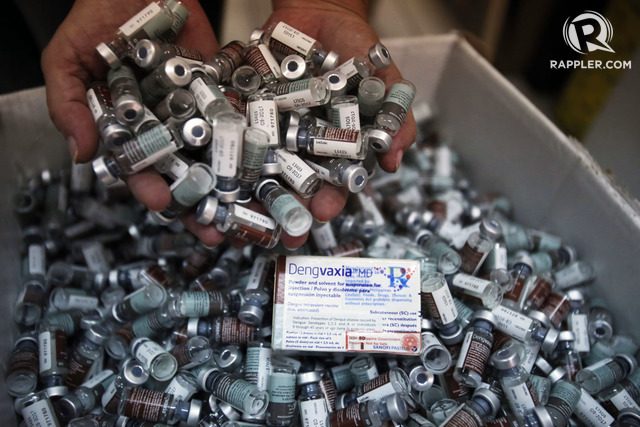SUMMARY
This is AI generated summarization, which may have errors. For context, always refer to the full article.

MANILA, Philippines – A new study confirmed that Sanofi Pasteur’s controversial vaccine Dengvaxia poses more risks for children who have not been infected by the dengue virus before immunization.
A study recently published in the New England Journal of Medicine confirmed the World Health Organization’s recommendation in April that Dengvaxia should only be administered to children who had prior infection.
“[Dengvaxia] protected against severe VCD (virologically confirmed dengue) and hospitalization for VCD for 5 years in persons who had exposure to dengue before vaccination, and there was evidence of a higher risk of these outcomes in vaccinated persons who had not been exposed to dengue,” the study said.
According to the study, the vaccine could prevent 11,000 hospitalization and 2,500 severe dengue cases if given to 1 million children over age 9. But the vaccine could also lead to 1,000 hospitalizations and 500 severe dengue cases in children who had no prior infection.
With a confidence interval of 95%, analyses showed that dengue hazard ratio falling behind the score of 1 proves that Dengvaxia works better, while a score of more than 1 means that the vaccine poses more risks.
The study also found that the risk of hospitalization among uninfected children aged 2 to 8 years old was high 18 months after receiving the vaccine. Meanwhile, children aged 9 to 16 years old had higher risk of hospitalization 30 months after getting the vaccine.
The study funded by Sanofi included 2,384 participants who had been vaccinated with Dengvaxia and another 1,194 participants in the control group.
The study noted, however, that precise risk estimates “could not be ascertained” because of limited baseline data.
In November, a previous clinical data analysis by Sanofi itself revealed the risks of the dengue vaccine. The new study confirmed Sanofi’s previous findings.
In the Philippines, where the government implemented a school-based dengue immunization program in several regions, Sanofi’s announcement resulted in public outrage and anti-vaccine sentiments.
The Senate and the House of Representatives conducted investigations into the program which was launched in April 2016 and suspended by the health department in December 2017. (TIMELINE: Dengue immunization program for public school students)
Aside from the Philippines, 10 other countries have approved the commercial release of the vaccine: Brazil, Costa Rica, El Salvador, Guatemala, Mexico, Paraguay, Peru, Indonesia, Singapore, and Thailand. – Rappler.com
Add a comment
How does this make you feel?
There are no comments yet. Add your comment to start the conversation.